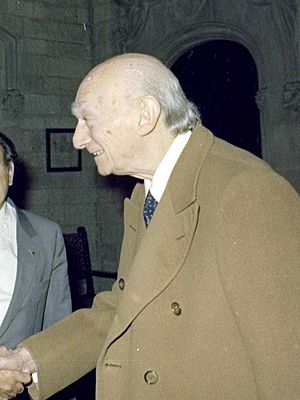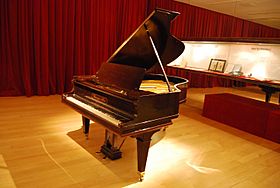Federico Mompou facts for kids
Frederic Mompou (born April 16, 1893 – died June 30, 1987) was a famous Spanish composer and pianist. He is known for writing short, beautiful, and often quiet pieces of music. His music often sounds gentle and personal.
Contents
Life
Early Years as a Musician
Frederic Mompou was born in Barcelona, Spain. His father was a lawyer, and his mother, Josefina Dencausse, was from France. Frederic also had an older brother, Josep Mompou, who became a painter. Josep's drawing of a simple farmhouse even appeared on the covers of Frederic's published music!
When Frederic was nine years old, he heard the famous French composer Gabriel Fauré play the piano. This experience deeply inspired him. Frederic later studied piano in Barcelona. Then, he moved to Paris, France, to continue his music studies. He wanted to study with Fauré, but that didn't happen. Instead, he learned from other great teachers like Isidor Philipp.
Frederic was a very shy and quiet person. Because of this, he decided not to become a concert pianist who performs for large audiences. Instead, he chose to focus on writing music. In 1917, he returned to Barcelona to avoid World War I. His first music, called Cants magics, was published in 1920.
Life in the 1920s to 1950s
Mompou went back to Paris in 1921. By this time, his music was becoming quite popular. People in Paris loved his gentle and unique style. One critic even called him a successor to the famous French composer Claude Debussy. Mompou sometimes played his own music, but only for small groups of friends, never in big public concerts.
Life in Paris wasn't always easy for him. He didn't publish any new music between 1931 and 1941. He returned to his home region of Catalonia in Spain when Germany occupied Paris during World War II. During this time, his father passed away, and his brother became very ill. The Spanish Civil War also worried him a lot. He even tried different business ideas, like bringing back his family's old bell-making business, to help with money.
In 1955, a ballet called La Casa de los Pájaros (The House of Birds) was performed in London. This ballet used music by Mompou, arranged for an orchestra.
In 1956, Mompou worked with another composer, Xavier Montsalvatge, on a ballet called Don Perlimpin. It was based on a play by Federico García Lorca. Mompou wrote most of the music for it.
In 1957, when he was 64, Mompou married Carmen Bravo, a pianist. She was 30 years younger than him. They were both married for the first time and did not have any children.
Later Years
In the mid-1970s, Mompou was a judge for a big international piano competition. He lived in Barcelona until he passed away in 1987 at the age of 94. He is buried in the Montjuïc Cemetery in Barcelona.
Discoveries
After his wife passed away in 2007, about 80 pieces of Mompou's music were found that no one had ever heard before! These were discovered in his home and at the National Library of Catalonia. Some of these newly found works were performed for the first time in Barcelona in 2008 and 2009.
Awards
Throughout his life, Mompou received many important awards. These included the Chevalier des arts et lettres from France, the Premio Nacional de Música from Spain, and an honorary degree from the Universitat de Barcelona. He also received the Gold Medal of the Generalitat of Catalonia in 1980.
Style
Mompou is best known for writing short, quiet, and very personal pieces of music. People often describe his music as "delicate" or "intimate." He was greatly influenced by French composers like Claude Debussy, Erik Satie, and Gabriel Fauré. This led to a style where his music doesn't develop much, but instead expresses deep feelings in very small forms.
He often used repeating musical patterns, and sounds that reminded people of bells. This bell sound was special to him because his mother's family owned a bell-making business! He also created a calm, meditative sound, which you can hear best in his famous work Musica Callada (which means Silent Music or Voice of Silence). This piece was inspired by mystical poems.
Mompou was also inspired by the sounds and smells of the seaside part of Barcelona. He loved the cries of seagulls, the sounds of children playing, and traditional Catalan culture. Sometimes, he didn't even use bar lines or key signatures in his music, which is unusual! His music is often based on a special chord he called Barri de platja (the Beach Quarter).
Selected Works
Piano Solo
- Impresiones íntimas (Intimate Impressions) (1911–1914) – 9 short pieces
- Pessebres (1914–1917) (Nativity Scenes)
- Scènes d'enfants (1915–1918) (Scenes of Children)
- Suburbis (1916–1917) (Suburbs)
- Cants màgics (1920) (Magic Songs)
- Fêtes lointaines (1920–1921) (Distant Celebrations)
- Charmes (1920–1921)
- Cançons i danses (1921–1979) (Songs and Dances)
- Dialogues (1923)
- Préludes (1927–1960)
- Variations on a Theme of Chopin (1938–1957)
- Paisatges (1942–1960) (Landscapes)
- El Pont (1947)
- Cançó de bressol (1951) (Lullaby)
- Música callada (Silent Music or Voices of Silence) (1959–1967)
Voice and Piano
- L'hora grisa (1916) (The Grey Hour)
- Cuatro melodías (1925) (Four Melodies)
- Comptines (1926–1943) (Nursery Rhymes)
- Combat del somni (1942–1948) (Dream Combat)
- Cantar del alma (1951) (Soul Song)
- Canciones becquerianas (1971) (Songs after Bécquer)
Ballets
- Don Perlimpin (1956; written with Xavier Montsalvatge)
Choral Music
- Los Improperios (The Insults), for choir and orchestra (1964)
- L'Ocell daurat (The Golden Bird), a cantata for children's choir (1970)
Guitar Music
- Suite Compostelana for guitar (1962; written for the famous guitarist Andrés Segovia)
- Cançó i dansa No. 10 (1953), arranged for guitar by Mompou
- Cançó i dansa No. 13 for guitar (1972)
Recordings
Mompou himself recorded some of his piano pieces in 1950 and then more of his piano music, including Musica callada, in 1974. For many years, not many other pianists recorded his works. However, after Mompou passed away, more musicians started to pay attention to his beautiful music.
Today, many pianists have recorded Mompou's pieces, including Stephen Hough, Arcadi Volodos, Daniil Trifonov, and Javier Perianes. A pianist named Jordi Masó has recorded all of Mompou's piano works. The Spanish singer Victoria de los Ángeles also recorded Mompou's song cycle El combat del somni. There's even a film of her singing one of these songs with Mompou playing the piano!
The famous guitarist Andrés Segovia recorded Mompou's Suite Compostelana, which was written especially for him.
See also
 In Spanish: Federico Mompou para niños
In Spanish: Federico Mompou para niños
 | William Lucy |
 | Charles Hayes |
 | Cleveland Robinson |



